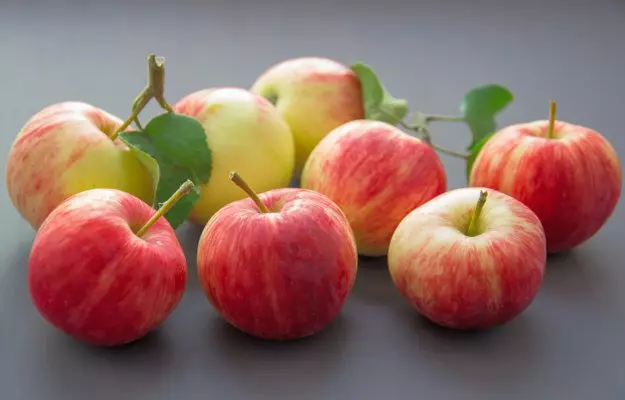Apple is one of the most popular, delicious and nutritious fruits on earth. There is a certain charisma and mystery in this bright red food and its sweet and juicy flavour is simply divine.
Apples are entirely edible including their skin. There are more than 7500 known cultivars of apple and each one has different uses. Red coloured apples are rich in antioxidants, which make them an ideal anti-ageing fruit and green and yellow apples contain plenty of quercetin, which helps enhance one's psychological health. Apple is also known to make your skin healthy, flawless and soft. However, apple seeds are believed to be dangerous if they are eaten.
Commercially popular apple varieties are usually soft but crunchy. Some of them are cultivated to be eaten raw and fresh (dessert apples), while some of them are cultivated for cooking (cooking apples) and making cider.
The flesh and the skin, which are a rich source of anthocyanins and tannins provide the main source of nutrients in an apple. This fruit is full of vitamins, fibre, and other nutrients which enrich it with several healing properties.
Apples can be used to lower cholesterol, maintain heart health and are good for the teeth. They can also be used to prevent cancer and control diabetes.
No wonder they say, “An apple a day keeps the doctor away”
Did you know?
Malus sieversii, the wild ancestor of apples is still found in central Asia, where apples are believed to be originated. Interestingly, the word Malus means either "apple" or "evil".
Some basic facts about Apples:
- Botanical name: Malus Domestica/ Malus pumila
- Family: Rosaceae
- Common Name: Apple, Seb
- Sanskrit name: Phalaprabhedaḥ
- Parts used: Skin, Pulp
- Native region and geographical distribution: Apple is being cultivated worldwide, with China being the largest producer. China produces around 44 million tonnes of apple every year. In India, apple is mostly grown in Kashmir, hills of Uttar Pradesh, Himachal Pradesh, Nagaland, Sikkim, Arunachal Pradesh, and Meghalaya.
- Interesting facts: It takes about 36 apples to produce 3.7 litres of apple cider, a popular and healthy type of vinegar
























